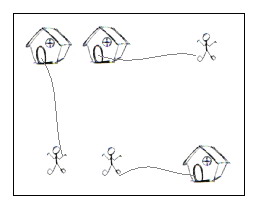Description
On a grid map there are n little men and n houses. In each unit time, every little man can move one unit step, either horizontally, or vertically, to an adjacent point. For each little man, you need to pay a $1 travel fee for every step he moves, until he enters a house. The task is complicated with the restriction that each house can accommodate only one little man.
Your task is to compute the minimum amount of money you need to pay in order to send these n little men into those n different houses. The input is a map of the scenario, a '.' means an empty space, an 'H' represents a house on that point, and am 'm' indicates there is a little man on that point.

You can think of each point on the grid map as a quite large square, so it can hold n little men at the same time; also, it is okay if a little man steps on a grid with a house without entering that house.
Input
There are one or more test cases in the input. Each case starts with a line giving two integers N and M, where N is the number of rows of the map, and M is the number of columns. The rest of the input will be N lines describing the map. You may assume both N and M are between 2 and 100, inclusive. There will be the same number of 'H's and 'm's on the map; and there will be at most 100 houses. Input will terminate with 0 0 for N and M.
Output
For each test case, output one line with the single integer, which is the minimum amount, in dollars, you need to pay.
Sample Input
2 2
.m
H.
5 5
HH..m
.....
.....
.....
mm..H
7 8
...H....
...H....
...H....
mmmHmmmm
...H....
...H....
...H....
0 0
Sample Output
2
10
28
Source
题目大意:有m个人要进h间房子,从当前位置(x1,y1)进入房子(x2,y2)的时间为|x1-x2|+|y1-y2|,问这m个人都进入房间所需的最小时间是多少。问题可以转化为带权二分图的最小权匹配,以sample 2为例先建立二分图:
(m1,h1)=4,(m1,h2)=3,(m1,h3)=4,(m2,h1)=4,(m2,h2)=5,(m2,h3)=4,(m3,h1)=5,(m3,h2)=4,(m3,h3)=3.
然后用KM算法求解,代码中的注释部分为最大权匹配。
 #include <iostream>
#include <iostream>

 const int MAX = 101;
const int MAX = 101;
 const int MAXN = 10001;
const int MAXN = 10001;
 const int inf = 0x7FFFFFFF;
const int inf = 0x7FFFFFFF;

 struct point
struct point {
{
 int x,y;
int x,y;
 }man[MAXN],home[MAXN];
}man[MAXN],home[MAXN];
 bool vx[MAX],vy[MAX];
bool vx[MAX],vy[MAX];
 int m,h,map[MAX][MAXN],lx[MAX],ly[MAX],match[MAX];
int m,h,map[MAX][MAXN],lx[MAX],ly[MAX],match[MAX];


 bool dfs(int u)
bool dfs(int u) {
{
 int i;
int i;
 for(vx[u]=true,i=0;i<h;i++)
for(vx[u]=true,i=0;i<h;i++)

 if(!vy[i] && lx[u]+ly[i]==map[u][i])
if(!vy[i] && lx[u]+ly[i]==map[u][i]) {
{
 vy[i]=true;
vy[i]=true;

 if(match[i]==-1 || dfs(match[i]))
if(match[i]==-1 || dfs(match[i])) {
{
 match[i]=u;
match[i]=u;
 return true;
return true;
 }
}
 }
}
 return false;
return false;
 }
}

 int kuhn_munkras()
int kuhn_munkras() {
{
 int i,j,k,min,ans;
int i,j,k,min,ans;
 for(i=0;i<m;i++)
for(i=0;i<m;i++)
 for(lx[i]=inf,j=0;j<h;j++)
for(lx[i]=inf,j=0;j<h;j++)
 if(map[i][j]<lx[i]) lx[i]=map[i][j];
if(map[i][j]<lx[i]) lx[i]=map[i][j];
 //for(i=0;i<m;i++)
//for(i=0;i<m;i++)
 // for(lx[i]=-inf,j=0;j<h;j++)
// for(lx[i]=-inf,j=0;j<h;j++)
 // if(map[i][j]>lx[i]) lx[i]=map[i][j]; 最大权匹配
// if(map[i][j]>lx[i]) lx[i]=map[i][j]; 最大权匹配
 for(i=0;i<h;i++) ly[i]=0;
for(i=0;i<h;i++) ly[i]=0;
 memset(match,-1,sizeof(match));
memset(match,-1,sizeof(match));

 for(i=0;i<m;i++)
for(i=0;i<m;i++) {
{

 while(true)
while(true) {
{
 memset(vx,false,sizeof(vx));
memset(vx,false,sizeof(vx));
 memset(vy,false,sizeof(vy));
memset(vy,false,sizeof(vy));
 min=inf;
min=inf;
 if(dfs(i)) break;
if(dfs(i)) break;

 for(j=0;j<m;j++)
for(j=0;j<m;j++) {
{

 if(vx[j])
if(vx[j]) {
{
 for(k=0;k<h;k++)
for(k=0;k<h;k++)
 if(!vy[k] && map[j][k]-lx[j]-ly[k]<min)
if(!vy[k] && map[j][k]-lx[j]-ly[k]<min)
 min=map[j][k]-lx[j]-ly[k];
min=map[j][k]-lx[j]-ly[k];
 //if(!vy[k] && lx[j]+ly[k]-map[j][k]<min)
//if(!vy[k] && lx[j]+ly[k]-map[j][k]<min)
 // min=map[j][k]-lx[j]-ly[k]; 最大权匹配
// min=map[j][k]-lx[j]-ly[k]; 最大权匹配
 }
}
 }
}
 for(j=0;j<m;j++) if(vx[j]) lx[j]+=min;
for(j=0;j<m;j++) if(vx[j]) lx[j]+=min;
 for(j=0;j<h;j++) if(vy[j]) ly[j]-=min;
for(j=0;j<h;j++) if(vy[j]) ly[j]-=min;
 }
}
 }
}
 for(ans=i=0;i<h;i++) ans+=map[match[i]][i];
for(ans=i=0;i<h;i++) ans+=map[match[i]][i];
 return ans;
return ans;
 }
}

 int main()
int main() {
{
 char ch;
char ch;
 int i,j,row,colum;
int i,j,row,colum;

 while(scanf("%d %d",&row,&colum),row||colum)
while(scanf("%d %d",&row,&colum),row||colum) {
{

 for(getchar(),m=h=i=0;i<row;i++)
for(getchar(),m=h=i=0;i<row;i++) {
{

 for(j=0;j<colum;j++)
for(j=0;j<colum;j++) {
{
 ch=getchar();
ch=getchar();
 if(ch=='m')
if(ch=='m')
 man[m].x=i,man[m].y=j,m++;
man[m].x=i,man[m].y=j,m++;
 else if(ch=='H')
else if(ch=='H')
 home[h].x=i,home[h].y=j,h++;
home[h].x=i,home[h].y=j,h++;
 }
}
 getchar();
getchar();
 }
}
 memset(map,0,sizeof(map));
memset(map,0,sizeof(map));
 for(i=0;i<m;i++)
for(i=0;i<m;i++)
 for(j=0;j<h;j++)
for(j=0;j<h;j++)
 map[i][j]=abs(man[i].x-home[j].x)+abs(man[i].y-home[j].y);
map[i][j]=abs(man[i].x-home[j].x)+abs(man[i].y-home[j].y);
 printf("%d\n",kuhn_munkras());
printf("%d\n",kuhn_munkras());
 }
}
 return 0;
return 0;
 }
}